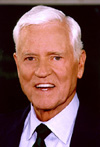Election Outcomes May Affect Tech Policy
November 5, 2002. Control of the Senate will switch from the Democrats to the Republicans as a result of the November 5 general election. Democrats and their allies held a slim one vote majority before the election. The Republicans now have at least a 51 vote majority, with two seats still undecided. The change of control will have major consequences across a wide range of policy areas. It will also affect confirmations, particularly of judges. However, the most important consequences for technology lie in the changes in control of a few committees.

Chairmanship of the Senate Commerce Committee will switch from Sen. Ernest Hollings (D-SC) to Sen. John McCain (R-AZ). Sen. Hollings (at right) has been the Senate's leading opponent of the Tauzin Dingell bill, and any other legislation to provide regulatory relief to the Bell companies. He has also sought to restrain FCC Chairman Michael Powell's market oriented approach to regulation.
Sen. Hollings is also the sponsor of S 2048, the Consumer Broadband and Digital Television Promotion Act, a bill to mandate copy protection technology. He is also a cosponsor of Sen. Joe Biden's (D-DE) bill, S 2395, the Anticounterfeiting Amendments of 2002.
Moreover, the Communications Subcommittee Chairmanship will likely return to Sen. Conrad Burns (R-MT).
Chairmanship of Senate Appropriations Committee will switch back from Sen. Daniel Inouye (D-HI) to Sen. Ted Stevens (R-AK). However, more important for technology will be the change of control of the Commerce Justice State and the Judiciary Subcommittee. Sen. Hollings also chairs this subcommittee. The Chairmanship may go to Sen. Judd Gregg (R-NH). Early this year, Sen. Hollings threatened to cut appropriations for the Federal Trade Commission (FTC) in order to pressure Charles James (head of the Antitrust Division) and Timothy Muris (Chairman of the FTC) to drop their plans to streamline the assignment of merger transactions.
The Chairmanship of the Senate Finance Committee will switch back from Sen. Max Baucus (D-MT), who won re-election, to Sen. Charles Grassley (R-IA). However, on technology related issues that fall within the jurisdiction of the Committee, the two have not diverged. Both, for example, worked for passage of trade promotion authority legislation.
The Chairmanship of the Senate Judiciary Committee will switch back from Sen. Patrick Leahy (D-VT) to Sen. Orrin Hatch (R-UT). This switch will have tremendous consequences in some non technology areas, such as confirmation of judges. The two also differ on several technology related homeland security issues.
However, there is no Democratic Republican split, or left right split, on the Senate (or House) Judiciary Committee on intellectual property issues.
 |
|
| DeWine | |
The Judiciary Committee also has a subcommittee with jurisdiction over antitrust issues. However, while the Chairmanship will likely switch back from Sen. Herb Kohl (D-WI) to Sen. Mike DeWine (R-OH), there will be few consequences. The two see eye to eye on antitrust matters, and conduct subcommittee matters in joint and cooperative fashion.
A larger antitrust issue is who President Bush will appoint to replace Charles James as Assistant Attorney General in charge of the Department of Justice's Antitrust Division.
Several seats have opened on the Senate Judiciary Committee for Republicans. Sen. Strom Thurmond (R-SC) did not run for re-election. Rep. Lindsey Graham (R-SC) won his seat with 54% of the vote. He is an attorney, and is currently a member of the House Judiciary Committee. Hence, he is a likely candidate for appointment to the Committee. Another current member of the Committee, Sen. Robert Torricelli (D-NJ), dropped out of his race for re-election.
Several other races are noteworthy. Sen. Mike Enzi (R-WY), who leads the effort in the Senate to pass to pass the Export Administration Act, won re-election. Meanwhile, one of the leading opponents of this legislation, Sen. Fred Thompson (R-TN), did not seek re-election. Republican Lamar Alexander won his seat.
Two Democrats on the Commerce Committee lost their re-election bids. Sen. Jean Carnahan (D-MO) lost to Jim Talent. Sen. Max Cleland (D-GA) lost to Rep. Saxby Chambliss (R-GA).
Finally, former FCC Commissioner Gloria Tristani challenged Sen. Pete Domenici (R-NM) for a New Mexico Senate seat. She lost 65-35.
Republicans Retain Control of House
Republicans retained control of the House of Representatives. Moreover, no Representatives active in debates on technology related legislation lost in their re-election efforts on November 5.
Rep. Billy Tauzin (R-LA) and Rep. John Dingell (D-MI), the Chairman and ranking Democrat on the House Commerce Committee each easily won re-election. Rep. Tauzin won 87% of the vote in his district, while Rep. Dingell won 72%. Although, Rep. Dingell faced a serious primary challenge in August as a result of redistricting.
Rep. Fred Upton (R-MI) (69%) and Rep. Edward Markey (D-MA) (unopposed), the Chairman and ranking Democrat on the Telecommunications Subcommittee, both won easy re-election. Rep. Cliff Stearns (R-FL) (65%) and Rep. Adophus Towns (D-NY) (98%), the Chairman and ranking member of the Commerce, Trade, and Consumer Protection Subcommittee, both won handily.
Rep. James Sensenbrenner (R-WI) (86%) and Rep. John Conyers (D-MI) (83%), the Chairman and ranking Democrat on the House Judiciary Committee, both won.
Rep. Howard Coble (R-NC) and Rep. Howard Berman (D-CA), the Chairman and ranking Democrat on the Courts, Internet and Intellectual Property Subcommittee, both won. However, Rep. Coble cannot continue as Chairman, because he is term limited under Republican rules. Rep. Bob Goodlatte (R-VA) (unopposed) and Rep. Lamar Smith (R-TX) (73%) are the leading contenders for the Chairmanship. Rep. Smith has backed intellectual property protection and cyber security legislation recently. Rep. Goodlatte is one of the House's most active and knowledgeable members on technology related issues.
On the Democratic side, Rep. Berman will likely remain as ranking Democrat. He is a Southern Californian who is a committed defender of the intellectual property rights of the entertainment industry. However, if he were to decline the position, the ranking Democrat would likely be Rep. Rick Boucher (D-VA) (66%), who is highly knowledgeable on tech issues, and a leading proponent of fair use rights and narrowing the anti circumvention provisions of the DMCA.
The northern Virginia incumbents all won easily: Rep. Jim Moran (D-VA) (60%), Rep. Tom Davis (R-VA) (83%), and Rep. Frank Wolf (R-VA) (72%).
The Silicon Valley area incumbents also all won easily: Rep. Zoe Lofgren (D-CA) (67%), Rep. Anna Eshoo (D-CA) (68%), Rep. Mike Honda (D-CA) (65%), and Rep. Ellen Tauscher (D-CA) (75%).
Rep. George Gekas (R-PA) (49%), a senior member of the Judiciary Committee, narrowly lost his re-election bid. Rep. Connie Morella (R-MD) (47%), a senior member of the House Science Committee, also lost.
Rep. John Shimkus (R-IL) (55%) defeated Rep. Dave Phelps (D-IL) (45%). The two were thrown together by redistricting. Rep. Shimkus is a member of the Commerce Committee, and its Telecom Subcommittee. In the present Congress, he has pushed the Dot Kids bill.
Rep. Charles Pickering (R-MS) (64%) defeated Rep. Ronnie Shows (D-MS) (35%). Rep. Pickering is a member of the Commerce Committee, and its Telecom Subcommittee. He was a leading opponent of the Tauzin Dingell bill.
Rep. William Luther (D-MN) (42%), also a member of the Commerce Committee, lost his bid for re-election to John Kline (53%).